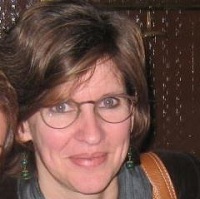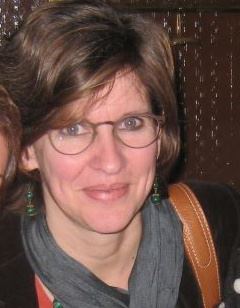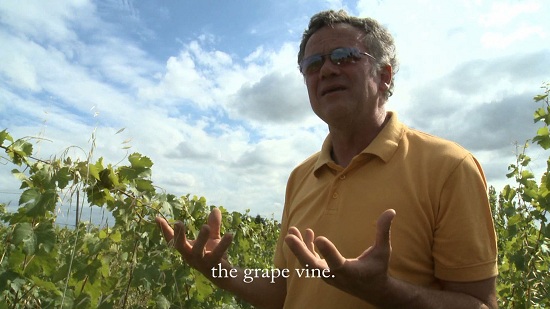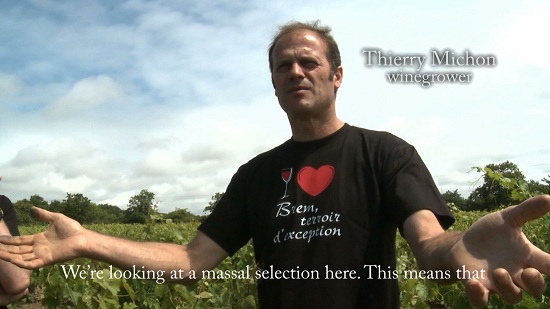
France Revisited meets with Jeanne Bernard, an American from Louisiana living in Paris, to discuss her documentary “New Wine From France,” an examination of the world of biodynamic wines, to learn how she got involved with biodynamics and filmmaking, and to discover her favorite shops and bars selling organic and biodynamic wines in Paris.
* * *
Wines produced from organic vineyards, having gotten their bearings straight in the 1980s and 1990s, took off at the turn of the century and have now made their mark throughout the winegrowing regions of France.
The number of organic vineyards (of which biodynamics are a subset) has expanded substantially since 1999. In 2010 more than 6% of the surface area of vineyards was considered organic in France, led by the regions Languedoc-Roussillon, Provence-Alpes-Cote d’Azur and Aquitaine.
Europe is far and away the world leader in organic wine farming, with Spain, Italy and France leading the way as producers and with Germany joining the group as a major consumer. In France, where sales of wines produced from organic agriculture increased by 70% between 2005 and 2010, you’d be hard pressed to find organic wines from Italy or Spain since 99% of the domestic consumption is homegrown. (All statistics above are from a study by Agence Bio, 2011).
And much of that consumption is taking place in Paris which, over the past decade, has witnessed a dramatic increase in the number of wine shops, wine bars, cafés, restaurants and sommeliers proposing wines produced from organic (bio or biologique) and biodynamic (biodynamique) agriculture. Such wines have even become mainstream in some quarters of the capital.
But what exactly is a biodynamic vineyard and what are the advantages or disadvantages of using biodynamics in developing wine?

Jeanne Bernard, an American living in Paris since 1985, set out to answer those questions in her documentary “New Wine From France,” an examination of the world of biodynamic wines through three uncommon vineyards in the Loire Valley and their winegrowers.
Jeanne had been a freelance writer and translator in Paris for roughly 20 years before taking the leap into filmmaking by writing and directing the documentary. In 2011 “New Wine From France” was shown in two wine film festivals: Oenovideo in Arbois, France, and Most Festival in the Penedès region near Barcelona, Spain. It has also been screened several times in France and can now be viewed in its entirety on Vimeo.
France Revisited caught up with the filmmaker as she was preparing one of the screenings in the Paris region.
France Revisited: Between your arrival in Paris in 1985 and your decision in 2009 to write and direct “New Wine From France” you’d probably drunk your share of French wine, but you were neither a wine expert nor a filmmaker. How then did such an ambitious project come about?
Jeanne Bernard: You are right. I was no wine expert. And I had never made a film. However I was a writer and storyteller. And I can’t think of a subject more fascinating than wine. It’s not only a vast subject, but it’s a profound one. It has cultural, geographical, historical, geological, and of course religious and even mystical aspects. It tells us much about ourselves. And I had always had a strong interest in wine, going back to a visit I made with my parents to the Paul Masson vineyard in Santa Clara Valley when I was a teenager. Later, when I moved to France, I found that when I asked questions about wine, the answers people gave were unsatisfactory.
The word “biodynamic” came up once in conversation with Hervé Lethielleux in my local wine bar in Paris. Hervé is a wine expert and was explaining what we were drinking. I wrote an article about the subject and interviewed Hervé, but I knew I had to do more. I could see myself in the vineyards with a camera. That’s when I knew I had to make a film. It all had to do with Hervé making a comment as he sipped a glass. Of course, the project would never have come about without the great support of IronBreaker. My brother John Bernard, the man behind IronBreaker, showed utter faith in me from a creative point of view.

FR: How did you learn all that goes into making a documentary, from writing to filming to creating a soundtrack to editing and now promoting?
JB: The main ingredient in making a documentary is passion. It’s what motivates you to do all the research and to lay the groundwork, for example, by taking hundreds of photographs before you even touch a movie camera; it’s what pushes you to convince other people to spend money on your project, and it’s what makes you tackle the problems that come up on various levels—technical, organizational, etc. And passion is not something you learn; it is something you have or don’t have for a given subject or for an angle on that subject.
Various passions came together in the making of this film. There were things I didn’t know about the wine world, that I didn’t understand; I realized also that these are things most of us don’t know and don’t think about when we drink wine. I wanted to understand. As for the rest, the writing and the filming, etc – I am a storyteller. I put in the hours, pulled out the index cards and the highlighter pens. I spent hours watching footage. I spent a lot of time alone, thinking.
I was lucky to have great technical people to work with in Franz Kennedy, the photography director, and Henri Le Boursicaud, the sound engineer. I worked side by side with each of them. I learned a lot from them; we had a great working relationship. I learned the technical things, and both Franz and Henri, who master these elements apart from being very creative people, showed respect for the way I worked. I respected their opinions also and this had a very positive effect on the whole process.
FR: What’s the difference between organic and biodynamic winegrowing?
JB: The film answers this question. Basically organic is the non-use of pesticides. Biodynamics is organic, but it takes things to another level. It is based on a positive philosophy of looking at nature and seeing how it works on its own, then working with it so that it gives its best to the grapes.

FR: In taste, what are the most noticeable differences between biodynamic and other wines?
JB: I am not an expert in wine tasting. I am learning every day. What I will say is that top sommeliers have recognized that the taste of the terroir is more apparent in biodynamic wine. For wine connoisseurs, this is a great quality; I would venture to say it is what wine is all about, though it is not necessarily what all wine drinkers think about when drinking a glass of wine. In the film, viewers will see how the organic life of the soil is of the utmost importance in terms of terroir. However, winegrowing and winemaking involve a set of factors, and I wouldn’t want to be categorical or peremptory about taste differences.
FR: In the film you interview the winegrowers Philippe Gourdon of Château Tour Grise, François Chidaine of Domaine François Chidaine, and Thierry Michon of Domaine Saint Nicolas. Why did you choose those three in particular?
JB: I have always loved Loire Valley wines and the Loire Valley itself. Hervé suggested two growers to me, but it was important for me to have three, for structure and balance. I told him to think of a third person. He had just met Thierry Michon and told me Thierry was in the Vendée, had a sparkly personality and was a great winemaker. The Vendée was not at all reputed for its wine, so I was intrigued. When I went out to meet Thierry and tasted his wine, it was obvious he belonged in the film. It was the same with Philippe Gourdon and François Chidaine. They were the right people for the project. All three of these men are great winegrowers, highly respected in the wine world, and they are “men of the earth.” I think the whole project was biodynamic in a way – it was in the stars.
FR: The film was selected for two film festivals in 2011, Oenovideo, a grape and wine film festival held last year in Arbois, France, near the Swiss border, and Most Festival, the first edition of a film festival dedicated to viniculture, wine and cava, near Barcelona. What were those experiences like?
JB: These were great experiences for a wine lover. I learned tons about Jura wine in Arbois and had the great pleasure of meeting the biodynamic winegrower and filmmaker François de Chavanes. Also, the mayor of Château-Chalon and his wife took me on a tour of their village, reputed to be one of the most beautiful in France. There, I learned all about the process involved in making vin jaune and about the importance of the marnes grises on the hillsides around the village. I learned about the different grape varietals there, the rather rustic local varietals. And the Jura has lots of organic winegrowers. I fell in love with Jura wines.
In Spain, Most Festival was great and it was the very first edition, organized by really enthusiastic film and wine lovers, young people. They were welcoming and energetic. They made the foreign filmmakers feel right at home in Catalonia. And I was able to discover the great Spanish cava made in the Penedès region, particularly at Recaredo vineyards, where my film was shown on European Wine Tourism day. I learned quite a bit about the history of winegrowing in the Penedès. They’ve got a very interesting wine museum in the town of Vilafranca del Penedès, where the festival took place. I also showed my film at a viticultural school and drank wine made by its students. I found the people of Catalonia to be very sophisticated and culturally rich; the young people speak several languages, Catalan, Spanish, English and French usually. It was a great experience.

FR: How has your interest in wine or in organic and biodynamic wines in particular developed since completing the film?
JB: When you enter the world of independent winegrowers, you discover it is a very human and generous one. Winegrowers who are passionate about what they do are really fascinating people to listen to. I happen to love wine, so I am having more fun drinking it now than ever. At professional wine tastings, I particularly love listening to winegrowers talk about the way they work and about all the elements involved in growing – the climate, their soil, their grapes and how they respond to these conditions. Their eyes start to light up when they explain how they work. I am learning things all the time, and that’s the great thing about drinking wine. There are always new things to discover.
FR: Any other festivals or screenings on the horizon?
JB: I just received information on a sustainability film festival in Italy. I will look into it. My film was made for television, so I am also working to get it sold there and I hope to get a DVD and VOD distributor into the bargain. More screenings in Paris and the other major cities in France would be great.
FR: What are your favorite wine shops and wine bars in Paris?
JB: I usually buy wine in my neighborhood in the 18th arrondissement. I like the Les Grandes Caves on Rue Damrémont. In fact the shop is so pretty that I filmed it and its manager at the time, Fréderic Navennec. It is now run by Adrienne Reitz and she gives great advice about wine. I also like Les Caves Dargent on Rue Ordenner for its wonderful selection, including by growers Philippe Gourdon and François Chidaine. I like a little wine shop on the Rue Dorsel in Montmartre where you can also get wonderful rillettes d’oie to serve with your wine. And I just discovered a very cool wine shop in the far reaches of the 12th, run by an old-fashioned maître sommelier who used to work at Fouquet’s. He has everything, including very affordable wine, in his shop. But it’s far from where I live! As for wine bars, I like Le Cave Café on rue Marcadet. Good wine selection. The bar is owned by an American. I like O Château near Les Halles. I like a little place on Rue Joseph de Maîstre in Montmartre and also Les Caves Lamarck, which are on the part of Rue Lamarck that winds its way up to Sacré Coeur. I am dying to go to Willie’s Wine Bar because the British owner Mark Williamson is reputed for choosing excellent wine. Plus I have met him and he has a great sense of humor. And soon, I will be anxious to try out a shop that has not yet opened – called L’Etiquette, which will be managed by Hervé Lethielleux. It’ll be on the Ile Saint Louis.
FR: You worked with several musicians living in Paris to create the soundtrack for the documentary. How did you find them and who are they?
JB: This was a great personal pleasure for me. I am a huge music lover, and my friend Chris Kenna provided me with all the music of his that I wanted. Sal Bernardi did the same. Also, the film came about largely because of my hanging out in small bars listening to Chris play with his band Moonray or with Sal. Something just clicked between the rebellious nature of rocking music and rocking wine. Music and wine are fun! My brother John Bernard, the producer of the film, is a fine guitarist and also wrote a piece of music for the film. I could hear music to go along with certain images. I guess when you start to see vineyards in your mind’s eye, and hear music in the background, you start to have a film.
FR: Are you a musician yourself?
JB: I’m a living room musician. In other words, not really. I play the piano a little and have been teaching myself the guitar. I sometimes write songs.
FR: Do you have another documentary or other major project in the works?
JB: I have nothing in the works, but I have lots of ideas.
© 2012
The 52-minute documentary can be viewed online. Grab a glass of wine, sit back and click here.

